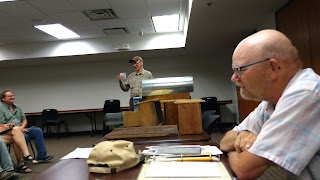General Business:
Dave Irvin called the meeting to order at 6:30 p.m.
General Business:
Johnson County Fair: The fair this year will be July 24-July 27. A sign-up sheet was passed around so people could volunteer to work in our tent, which this year will be shared with the Burr Oak Land Trust group. Dave encouraged people to attend as it is a fun, entertaining and educational event. He noted how more informed about bees visitors seem to have become in recent years.
IHPA Summer Field Day: Saturday, July 15th in Linn County at Wickiup Hill Learning Center. Attendance is limited to 125 participants, so early registration is recommended. See the Iowa Honey Producers website for further details.
Iowa State Fair entries: The deadline for entries for the 2017 State Fair is July 14th. In the past, Indian Creek Nature Center has helped take area entries to the Fair. It is uncertain if that is happening this year so interested members are encouraged to contact Indian Creek.
Bee Removal: Dave has received numerous requests this spring to remove bees and asked for and received volunteers to help take some of those jobs.
Beekeeping Equipment (Floyd Otdoerfer): Floyd presented several items he recommends carrying in his field bucket. First, he described how a frame gripper can be very handy and less likely to upset the bees by rolling them between frames as the frame is removed. These can possibly be purchased locally at Theisen's or Paul's Discount though certainly can be ordered through any of the beekeeping catalogs. He also keeps a bread knife or even a paint scraper with a good handle to remove bur comb. A magnifying glass was suggested (Jim Davis) as a way to observe eggs and young larva.
In other bee management topics, Floyd suggested the use of blue shop towels coated with apple cider as a means of removing mites, as described by Randy Oliver, Soak the shop towel with the cider or perhaps cooking oil and place it atop the brood box. As the bees walk over the towel the mites can be rubbed off. Floyd suggests doing this several times during the summer season, and since it is a food-safe activity it can be done with supers in place.
Floyd also discussed the use of linseed oil as a way of preserving hive body parts such as bottom boards, in lieu of painting them. He also coats the top edges of hive bodies and the box corner joints.
He next demonstrated a system he uses to help avoid overwintered nuc losses in late spring. He places foil on top of the frames, covered with an insulating "pillow". On top of this be puts a curved piece of sheet metal, with a block on top to hold it in place.
General Discussion:
--Several members talked about their favorite types of fuel. Wood pellets can burn long though they tend to burn hot, so use another material such as grass to cool the smoke. Other fuels suggested included wood chips, sawdust and corrugated cardboard.
--How high should a colony be off the ground? A big concern is how high one wants to lift a heavy super. A platform to stand on to lift the top supers more easily was suggested.
--A discussion of various animals that eat bees ensued. Possums will eat bees off the landing pad. Dragonflies have also been noted flying around the hives, supposedly to catch and eat bees in flight.
--How many times can honey frames be reused? Several members said they can be used time and again as long as they are structurally fit.
Jim Davis, filling in for Erin Miller


No comments:
Post a Comment